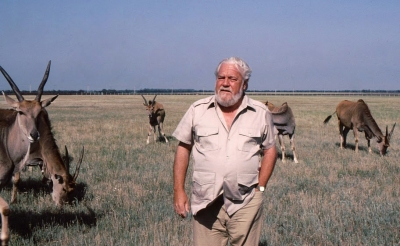
A scraggly looking Newt Scamander with his magical suitcase packed with fantastical creatures captured our imagination after Harry Potter. But did you know J.K. Rowling based the character partly on the British naturalist and writer, Gerald Durrell? The wildlife conservationist strove to turn zoos into sanctuaries for endangered species giving a new direction to conservation.
A magical childhood
Childhood, it is said, is a magical time that shapes us into our future selves. And Durrell was lucky to spend a part of his childhood surrounded by books and a part of his childhood surrounded by books and animals on the Corfu island in Greece. From catching the glittering purple-and-orange agamas lounging on the gypsum cliffs and watching dung beetles in action to getting a ringside view of the dragonfly larvae hatching. Durrell could witness the most intimate and magical moments of the animal world. Later, he recounted his childhood fascination with the animal kingdom in his delightful autobiographical account The Corfu Trilogy – My Family and Other Animals; Birds and Relatives; and the Garden of the Gods.
Born in Jamshedpur in India on January 7, 1925, Durrell had moved to Corfu with his family when he was 10, after his father’s death. On Corfu, he met Theodore Stephanides, a Greek-British scientist, who mentored the curious Durrell. The brilliant scientist who played a huge role in Durrell’s development features in the Corfu Trilogy.
Pursuit of a dream
With the outbreak of World War II in 1939, Durrell was forced to move in England. Without a formal education, he found it difficult to find work in England. So he followed his passion and started working as a helper in aquariums and pet stores.
Durrell yearned to go on wildlife expeditions to explore the animal world. His lack of experience, however, threw very few opportunities his way. Finally, he got his lucky break in 1947. He travelled to the British Cameroon) with the acclaimed ornithologist John Yealland. He returned home with a collection of exceptional animals, which he sold to prominent zoos including the London zoo. But Durrell was unhappy with how the zoos treated animals. He dreamed of turning the zoos into breeding grounds and sanctuaries for endangered species, instead of merely places where animals are kept in captivity for public environment.
Writing for conservation
That’s when Durrell started writing humorous autobiographical accounts to raise money for conservation as well as more expeditions. The success of his books The Overloaded Ark and My Family and Other Animals helped him travel and acquire an enviable collection of wild and endangered animals. But instead of giving them away to other zoos, where he wasn’t sure how they would be treated. Durrell set up his own menagerie. And the Jersey Zoo opened its doors in 1959. He dedicated it to ‘saving species from extinction.’ Through Durrell’s vision, the zoo has today become the home of the Durrell Wildlife Conservation Trust. It runs breeding programmes and rehabilitates endangered species such as gorillas, lemurs and tortoises before releasing them into the wild.
Legacy
Durrell believed that the wiping out of an animal species should be considered “a criminal offence.” In 1988, a time capsule was buried in his park, with a letter to future generations written by Durrell, “We hope that there will be fireflies and glow-worms at night to guide you and butterflies in hedges and forests to greet you. We hope that your dawns will have an orchestra of birdsong and that the sound of their wings and the opalescence of their colouring will dazzle you. We hope that there will still be the extraordinary varieties of creatures sharing the land of the planet with you to enchant you and enrich your lives as they have done for us. We hope that you will be grateful for having been born into such a magical extinction today, the world truly needs another Durrell!
Oh Really?
- Durrell attended St. Joseph’s (North Point) School, Darjeeling. His father worked as an engineer in the British Raj. His older brother, Lawrence was a popular British poet and travel writer.
- The Durrell Wildlife Conservation List comes out with the “Red List of Endangered Species.” The ploughshare tortoise, Madagascar big-headed turtle, mountain chicken, and pygmy hog are some of the endangered species that feature on this list.
Picture Credit : Google
